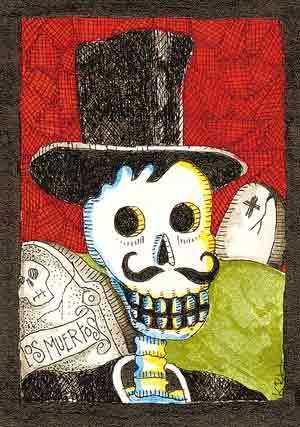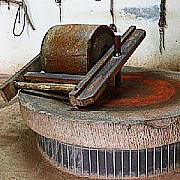Lol.
It is like a finger pointing to the moon~
If you pick your nose first all you see is big green booga.
Daoist Cultivation
36 posts • Page 3 of 3 • 1, 2, 3
Re: Daoist Cultivation
C-Hopkins wrote:Jarek-
The book irself makes itself very clear.
The most important part of cultivation is UNDERSTANDING REALITY,
And as many books say, this part cannot be taught. I've spoken to several high level Daoist masters who have confirmed the following~
Studying the Dao and studying qigong are two different things.Qigong is an adjunct practice to the actual Dao.
While having a teacher in this regard is beautifull thing, there are those who will come to the Dao through other means.
No man can tell another whether they have the Dao or not. This is a personal experience, and when one knows, they know.
The Dao cannot be taught, it must be found...
It is very simple,but in it's simplicity very mysterious.
I'll speak no more on this subject.
I agree with what you wrote. The only point I'd like to make is that to practice internal alchemy you need a qualified teacher; it is very difficult - if not impossible - to figure it out yourself just be reading books on the subject. Please note that by internal alchemy I do not mean Qigong - they are not equivalent at all.
FWIW,
Jarek (back to the lurking mode...)
- Jarek
- Great Old One
- Posts: 209
- Joined: Fri May 23, 2008 12:21 am
Re: Daoist Cultivation
D_Glenn wrote:Ah thanks.
I'd found a link to some buddhist stuff that use the Hun soul to explain reincarnation- saying the big shen (consciousness/you) dies, the Po returns to the earth, and the Hun returns to the heavens but can come back into a new person - different shen but the same Hun. So the question is this what is considered part of the buddhist thought that has been added into the taoist schools like quanzhen? Or is it just considered 'Chinese' or 'folk' religion?
.
Well, I'd have to see exactly which Buddhist materials you are referring to. This sort of an explanation can be found in, for example, the Mouzi lihuo lun which a.) is very early (2nd-3rd century) and reflects an incomplete understanding of Buddhism and b.) is an apologetic text that is attempting to explain the new, foreign concepts of Buddhism to a Chinese audience, so it contains a lot of specific equation of Buddhist and native Chinese concepts. From an orthodox Buddhist standpoint, it would be wrong to equate the hun/po with that aspect of the individual that undergoes rebirth, because that would imply that there is some sort of permanent, persistent "self." Actually if you are interested in this you might check out Steve Bokenkamp's new book entitled Ancestors and Anxiety: Daoism and the Birth of Rebirth in China
As for Buddhist influence in Quanzhen, by the Song dynasty it becomes very difficult to disentangle the Buddhist and Daoist elements in these movements because there has already been constant interaction between the two forms of religious practice for nearly a millenium. So, for example, by Song times the entire complex of rebirth/reincarnation has been worked into most, if not all, forms of Daoism, along with notions of karma, etc.; there is blatant copying of Buddhist literary forms, In Quanzhen there is also some explicit borrowing from Buddhism, for example, Wang Chongyang (founder of Quanzhen) was said to encourage his followers to study, in addition to Daodejing, the Heart Sutra and Confucian Classic of Filial Piety, representing his desire to harmonize the "three teachings." The particular influence of Chan Buddhism is evident in Quanzhen; for example in one of the hagiographies of Wang Chongyang that I have read, there is a story that Bodhidharma one day appeared before him to verify that Wang had attained transcendence.
Here is a passage from the "Recorded Sayings of the Perfected [Ma] Danyang," Wang's eldest disciple, that illustrates some of the Buddhist influence in Quanzhen (actually the text itself is such an example, as the genre of yulu/"recorded sayings" is one that developed within Chan Buddhism and later was used by both Daoists and neo-Confucians). A good resource if you are more interested in Quanzhen is Stephen Eskildsen, Teachings and Practices of the Early Quanzhen Taoist Masters http://books.google.com/books?id=vFBy3cvteTQC.
The master asked the assembly, "In one day, how many time-periods are there?" The students replied, "In one day, there are six time-periods." The master said, "Altogether, day and night, how many time-periods are there?" The students said, "In day and night, there are altogether twelve time-periods." The master said, "In the twelve time-periods of day and night, the Dao of Heaven is in motion, revolving and producing change. Is there any moment when it ceases?" The students replied, "There is no cessation." The master said, "All those who study the Dao should model themselves on the Dao of Heaven, setting in motion the production of change within their own body. Throughout the twelve time-periods, be constantly pure and still, and do not give rise to any impure thoughts; only this is true cultivation. As days and months pass, with no interruption [in practice], you will ultimately become a divine transcendent. If you slack in your practice, how will you attain understanding? Observing you all, I see that within the twelve time-periods, there is not a single hour in which you are concentrating single-mindedly on the Dao. Having received offerings from lay believers of the ten directions, how will you repay them? When, one day, you close your eyes and re-enter the cycle of birth and death, when will you be able to leave it? I will now give you all some instructions. Just purify your mind and do away with your desires; do not sully yourselves by [coming into contact with] the myriad causal conditions. When your spirit and qi are flowing harmoniously, this is the Dao. If you practice in accordance with this, you will not go astray. If you cannot attain results with this practice due to your own laziness, it is no fault of mine! How can you not think of your seven generations of ancestors -- in previous lives they have generated all sorts of bad karma, and are undergoing all sorts of sufferings in the netherworld, hoping that their descendants will attain the Dao and deliver them into a Heavenly rebirth. Each of you should bear this in mind, and give rise to the resolute determination to embrace the Dao until death. This is my desire." When the students heard the compassion in his voice, they were each delighted, and vied with each other to be the most diligent.
通背神拳誰敢擋﹐無影無形無柔剛。兩手捧定千斤法﹐專打邪魔鬼神忙。
-

josh - Great Old One
- Posts: 261
- Joined: Tue May 13, 2008 9:06 am
- Location: los angeles
Re: Daoist Cultivation
You cannot learn Internal Alchemy - if this is what you mean by Dao - from a book, you need a qualified teacher who will lead you through the process, and individual practice is the key to achieving true understanding.
When Taoists talk about understanding they mean "悟", which is more about having direct experience of certain phenomena rather then intelectual understanding.
In fact the key is to have a completely quiet mind, without any thoughts, any desires. Only then the true practice starts.
This is about the most intelligent thing I have read through out this entire post and it has been ignored completely - lol
TAOISTCALENDARS.ORG
-

Methods - Wuji
- Posts: 515
- Joined: Sun Sep 07, 2008 9:55 pm
- Location: Temecula, CA
Re: Daoist Cultivation
Methods wrote:You cannot learn Internal Alchemy - if this is what you mean by Dao - from a book, you need a qualified teacher who will lead you through the process, and individual practice is the key to achieving true understanding.
When Taoists talk about understanding they mean "悟", which is more about having direct experience of certain phenomena rather then intelectual understanding.
In fact the key is to have a completely quiet mind, without any thoughts, any desires. Only then the true practice starts.
This is about the most intelligent thing I have read through out this entire post and it has been ignored completely - lol
i don't think it has been ignored completely
i saw it and agree with it
just did not feel it needed any comment-
as with everything else people will read it and the experience will be different for everyone
franklin
- Franklin
- Great Old One
- Posts: 1382
- Joined: Tue May 13, 2008 5:56 am
- Location: Taipei, Taiwan
Re: Daoist Cultivation
Methods wrote:You cannot learn Internal Alchemy - if this is what you mean by Dao - from a book, you need a qualified teacher who will lead you through the process, and individual practice is the key to achieving true understanding.
When Taoists talk about understanding they mean "悟", which is more about having direct experience of certain phenomena rather then intelectual understanding.
In fact the key is to have a completely quiet mind, without any thoughts, any desires. Only then the true practice starts.
This is about the most intelligent thing I have read through out this entire post and it has been ignored completely - lol
I took it was directed to C-Hopkins but none the less it is a great post which I think we all can agree with. Kudos Jarek, you should lurk less and post more.
***
Josh, thanks again, that answers a lot of questions I had.
Would you happen to know when the idea of the 3 Huns and 7 Po came about? and what the most common version is?
Some examples: The Hun ((魂) are made up of:Tai Guang (胎光), Suan Ling (爽灵) and You Jin (幽精).) and the 7 Po ((魄) are made up of: Shi Gou (尸狗), Fu Fu (伏夫), Que Yin (雀阴), Tun Zei (吞贼), Fei Du (非毒), Chu Hun (除秽) and Chou Fei (臭肺).) --http://www.taoism.org.sg/knowingtaoism.htm
And in a different school: Hun is Yu Qing (the most subtle and outer aspect of Hun) Sheng Qing (middle in subtlety of the three) Tai Qing (the most interior of the Hun energy and closest to the physical energies of the Po soul), and the Po are like the 7 chakras of the physical body.
***
I can't find the link on the buddhist text. I thought it was in here somewhere: http://www.chinaknowledge.de/index.html
One part moves, every part moves; One part stops, every part stops.
YSB Internal Chinese Martial Arts Youtube
YSB Internal Chinese Martial Arts Youtube
-

D_Glenn - Great Old One
- Posts: 5341
- Joined: Fri May 16, 2008 4:04 pm
- Location: Denver Colorado
36 posts • Page 3 of 3 • 1, 2, 3
Return to Xingyiquan - Baguazhang - Taijiquan
Who is online
Users browsing this forum: johnwang and 47 guests

